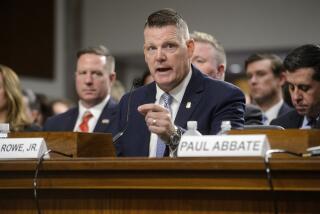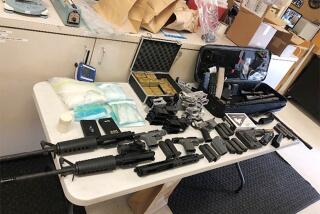Report describes gun agents’ ‘state of panic’
Seattle — Federal gun agents in Arizona -- convinced that “someone was going to die” when their agency allowed weapons sales to suspected Mexican drug traffickers -- made anguished pleas to be permitted to make arrests but were rebuffed, according to a new congressional report on the controversial law enforcement probe.
Agents from the federal Bureau of Alcohol, Tobacco, Firearms and Explosives told congressional investigators that there was “a state of panic” that the guns used in the shooting of U.S. Rep. Gabrielle Giffords in Tucson in January and two U.S. agents in Mexico a month later might have been sold under the U.S. surveillance operation.
“I used the word anxiety. The term I used amongst my peers is pucker factor,” Larry Alt, special agent with ATF’s Phoenix field division, told investigators preparing a joint staff report for Rep. Darrell Issa (R-Vista), chairman of the House Committee on Oversight and Government Reform, and Sen. Charles E. Grassley (R-Iowa), ranking member of the Senate Judiciary Committee. The report will be released Wednesday in Washington, D.C.
Neither of those shootings was ultimately linked to the “Fast and Furious” probe, though two weapons sold to a suspect under surveillance were found at the scene of the fatal shooting of Border Patrol Agent Brian Terry near Nogales, Ariz., in December.
Terry’s family will be among the key witnesses at an oversight committee hearing Wednesday on the ATF operation, under which the bureau allowed purchases of high-powered weapons in an attempt to track their progress into the hands of Mexican drug cartels. According to the report and numerous interviews with The Times, several ATF agents regarded the operation as dangerous and misguided.
At least 195 of the weapons have been traced to Mexico, found mainly at crime scenes, but ATF agents quoted in the report said more than 1,700 firearms were trafficked “to known criminals or cartel elements south of the border and elsewhere” under the operation.
“I cannot see anyone who has one iota of concern for human life being OK with this,” Agent John Dodson told committee interviewers.
In one case, Agent Pete Forcelli told the interviewers, an agent was making insistent calls over the radio, saying that gun traffickers had recognized him and begging for permission to stop the suspects. “But he was told to not stop the car with the guns in it,” he said.
Dodson said the target was followed picking up money, buying guns and dropping them off somewhere else but recognized he was being followed and made obvious attempts to evade the surveillance. “I mean, there is a verbal screaming match over the radio about how -- what are you talking about? There is no better time or reason to pull this guy over than right now,” Dodson related.
Issa and Grassley have been butting heads with ATF supervisors and senior officials at the Justice Department who signed off on the Project Gunrunner operation, which was intended to begin catching the powerful drug cartel traffickers in Mexico and the U.S. who were receiving weapons from the relatively low-level “straw purchasers” who were paid to buy them from U.S. gun dealers.
The two agencies, the Republican congressmen say, have refused to provide documents about the origin, direction and supervision of the operation.
The Justice Department has provided some information, but officials say disclosing their files now could compromise the trial of the traffickers accused of purchasing the weapons found at the scene of Terry’s killing, and also that of one of the suspected border bandits, Manuel Osorio-Arellanes, 34, who was arrested at the scene of the Terry shootout and faces charges of second-degree murder.
“Fighting criminal activity along the Southwest border -- including the illegal trafficking of guns to Mexico -- has been a priority of this administration and this Department of Justice. The attorney general takes the allegations that have been raised by some ATF agents about the Fast and Furious operation seriously, which is why he has asked the inspector general to investigate the matter,” Justice Department spokeswoman Tracy Schmaler said, adding that the department had made it clear that “under no circumstances should guns be allowed to cross the border into Mexico.”
In a letter Monday to Issa, ranking House oversight committee member Elijah E. Cummings (D-Md.) said that pursuing the probe now broke with past committee policy of standing down until criminal prosecutions are complete. “We’re all for conducting a responsible investigation to out any wrongdoing,” said Ashley Etienne, Democratic committee spokeswoman. “But we can’t do it at the expense of bringing these guys to justice.”
kim.murphy@latimes.com
More to Read
Sign up for Essential California
The most important California stories and recommendations in your inbox every morning.
You may occasionally receive promotional content from the Los Angeles Times.










